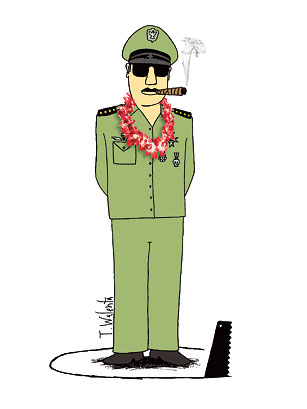
After witnessing round after round of layoffs in journalism, I’ve learned that you should always take the package, the sooner the better. Yet the dictators of Middle East countries gripped by massive uprisings — some in situations nearly as dire as that of print media — are not gracefully bowing out in return for a sweet retirement deal. If I were running Yemen and 20 angry teenagers gathered in a square and started chanting for my death, I’d take the next Yemenia flight out, then Skype my farewell speech while ordering Nobu’s crab tacos and petting dolphins at the Dubai Atlantis. These guys are sticking around to run countries I don’t even want to visit. “I was in Tahrir Square for the first three days of the protests,” says Steven Cook, a senior fellow at the Council on Foreign Relations, who could not believe that Hosni Mubarak didn’t skip out right away. “I kept saying, ‘The dude is old! He’s sick! What does he need this bullcrap for anymore?'” Instead, Mubarak stayed for weeks and is now facing charges of murder and corruption. If he had stepped down a week earlier, the dude could have been freely roaming Seaside Heights, N.J.
Ivory Coast’s Laurent Gbagbo was allegedly offered a teaching job at Boston University early this year, but he waited for a non–safety school and wound up arrested and held at the Golf Hotel in Abidjan, whose three TripAdvisor reviews are titled “Wilting flower, needs some rejuvenation,” “Not worth the money” and “Da non prendere in condierazione.” Muammar Gaddafi is still hanging on in Libya even though his main buxom Ukrainian nurse fled back home. If there’s a harbinger that things aren’t going well, it’s when your buxom hangers-on take off. Gaddafi needs to watch more of those VH1 reality shows about Bret Michaels. Back in the pre-Facebook, pre-Twitter time when everyone was less obsessed with how many followers they have, dictators were willing to walk away from their subjects. In 1986, Ferdinand Marcos ditched the Philippines for Hawaii, taking his wife Imelda and millions of dollars. Proving what a great career move that was, last year Imelda, 81, was voted into a seat in the Philippines House of Representatives. African dictators went to France. The Shah of Iran hopped around between Egypt, Morocco, the Bahamas, Mexico and the U.S. Idi Amin, who supposedly ate people, spent 24 good years in exile before dying in the same place Tunisia’s dictator fled to earlier this year: Jeddah, Saudi Arabia, a city with a Fuddruckers. Nobody is eating people when there’s a Fuddruckers in town.
Part of the problem now is that, like privacy, a good package is harder to come by. “The Daily Telegraph is going to send a photographer to whatever beach Gaddafi is at, and people are going to start protesting. You can’t live in anonymity anymore. It’s a more complicated prenup than it used to be,” says Kori Schake, a research fellow at the Hoover Institution and former deputy director for policy planning with the State Department. Plus, now there are all these international criminal courts that could eat up a lot of your postdictator beach time.Some of these guys might not be leaving because they don’t even know how bad things have gotten for them. Sure, the foreign press says they suck, but it has been saying that for years. In 1986, I heard Howard Stern parody John Mellencamp’s “R.O.C.K. in the U.S.A.” with “K.I.L.L. Colonel Gaddafi,” and yet against everyone’s expectations, 25 years later, Howard Stern is still on the radio. “The problem for dictators is they don’t have market signals. They don’t know what their own public thinks,” says Schake. It doesn’t help that they control the press. In a democracy, politicians can get much clearer notices to pack it up. “Newt Gingrich can read the newspaper,” Schake points out.
The trick is to make dictators offers they won’t want to refuse. Let’s hook Gaddafi up with a spot on Dancing with the Stars, where, I’m pretty sure, most of the female dancers are buxom Ukrainians. What downside would there be in letting Kim Jong Il direct the Broadway version of Spider-Man? Let Syria’s Bashar Assad do whatever the French equivalent of Dancing with the Stars is, which I’m pretty sure is cocaine. We offer the guy running Yemen a free appetizer at Outback Steakhouse, and that might be good enough at this point to get him to step aside. Sure, offering refuge to dictators and their dirty money would make us look bad. But we’ve already looked bad supporting these tyrants for decades. At least this would save tens of thousands of lives. And Donald Trump will have a bunch of new friends. This article originally appeared in the June 6, 2011 issue of TIME.
See TIME’s photo gallery, “Tempers Flare Across the Middle East.”
See TIME’s special report: “The Middle East in Revolt.”